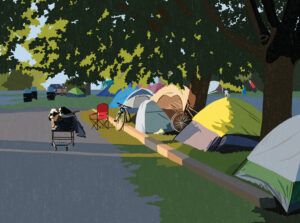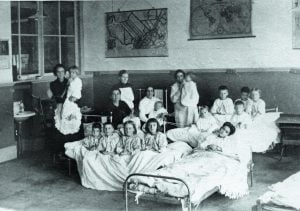
People & Culture
Placing the Pandemic in Perspective: Coping with curfew in Montreal
For unhoused residents and those who help them, the pandemic was another wave in a rising tide of challenges
- 2727 words
- 11 minutes
People & Culture
The Irish-Canadian novelist muses on the parallels between the 1918 pandemic and the one happening now

Though her novel is set during the 1918 Spanish flu pandemic, the parallels to the social upheaval taking place today are legion. The Pull of the Stars by Irish-Canadian author Emma Donoghue had its publication date moved up from 2021 to July 2020. The early publication took advantage of the appetite for all things pandemic, while also providing readers with a deeper understanding of today’s turmoil. In an inner-city Dublin hospital, three female healthcare providers — a nurse, a doctor and a young volunteer — battle to save lives in a maternity ward where pregnant mothers infected with the flu are quarantined together.
Donoghue spoke with Canadian Geographic about why pandemic novels are so popular and what they tell us about society.
On what drew her to the idea of writing a pandemic novel
I was prompted by articles published at the centenary of the 1918 flu pandemic. I wrote The Pull of the Stars very much as a historical novel, but I was trying to give it a modern post-apocalyptic feeling. I wanted to capture the strange, spooky atmosphere of a modern city grinding to a halt because of this inexplicable plague.
On researching the novel
I read modern and historical texts. So, for instance, I read Brian Goldman’s writing about modern emergency wards — the atmosphere and the stress and the dark humour. I also read books about the Spanish flu from all over the world. I learned that women in late pregnancy were the most vulnerable to catching this flu. I thought, that’s really interesting because each patient would have two different medical dramas going on — the flu and birth. And I held onto that as a sort of microcosmic way to look at this global development.
On pandemics revealing injustice
When I set the novel in an inner-city hospital that would serve the poor, I just thought that would be more interesting because there would be a gap between Julia Power [the nurse] and most of her patients, and she would address issues like how poverty makes people sick. I was thinking of this in a historical sense, but when the current pandemic hit, it became clear that COVID-19 has also hit people so unfairly.
On how this pandemic novel can be considered comforting
I find it comforting to plunge myself into slices of history — it can take you out of your life and give you a bit of historical perspective on something like COVID-19. Even if it seems like a large number of people today are bizarrely anti-science, the general level of scientific understanding is still pretty high compared to when nations grappled with the Spanish flu. Everyone was just completely blundering.
On what a virus says about our society
Pandemics give us a chance to show a society seriously rattled overnight by some external enemy. One thing I liked about writing a pandemic novel is that I could write about how, for the most part, people behave pretty well to each other. People are pretty helpful to each other because there’s so much external conflict.
Are you passionate about Canadian geography?
You can support Canadian Geographic in 3 ways:

People & Culture
For unhoused residents and those who help them, the pandemic was another wave in a rising tide of challenges

People & Culture
The story of how a critically endangered Indigenous language can be saved

History
The little-known story of the 1918 Spanish Flu and how we're preparing for the next great pandemic

People & Culture
The death of an unhoused Innu man inspired an innovative and compassionate street outreach during the nightly curfew in 2021